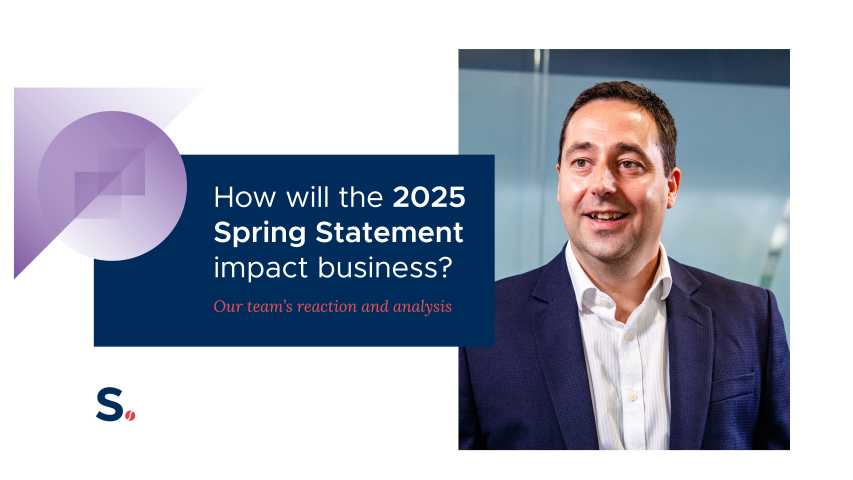
The Chancellor met her commitment that there would be no major tax announcements in the Spring Statement. However there were a number of tax changes announced in the Budget in October, many of which will take effect from April 2025. We have included a recap of these changes below
Business
Making Tax Digital (MTD) for Income Tax
The rollout of MTD for Income Tax will be expanded to include a wider range of small businesses and will operate as follows:
- It will start from April 2026 for sole traders and landlords with qualifying incomes over £50,000.
- It will extend to those with qualifying incomes over £30,000 in April 2027.
- It will extend again to those with qualifying incomes over £20,000 from April 2028.
Comment |
|
The decision to reduce the threshold to £20,000 from April 2028 is expected to affect 900,000 sole traders and landlords. As part of the ongoing rollout, the government will continue to explore how it can best bring the benefits of digitalisation to a greater proportion of the four million sole traders and landlords who have income below the £20,000 threshold. |
In addition, the following groups will not be required to use MTD for Income Tax: customers who have a Power of Attorney, non-UK resident foreign entertainers and sportspeople who have no other income sources that count as qualifying income for MTD for Income Tax and customers for whom HMRC cannot provide a digital service.
Also, the following groups will not be required to join MTD for Income Tax over the course of this Parliament: ministers of religion, Lloyd’s Underwriters and recipients of the Married Couples’ Allowance and Blind Persons’ Allowance.
Finally, the government will increase late payment penalties for VAT taxpayers and Income Tax Self Assessment taxpayers as they join MTD for Income Tax from April 2025. The new rates will be 3% of the tax outstanding where tax is overdue by 15 days, plus 3% where tax is overdue by 30 days, plus 10% per annum where tax is overdue by 31 days or more.
Corporation Tax rates
The government has confirmed that the rates of Corporation Tax will remain unchanged which means that, from April 2025, the rate will stay at 25% for companies with profits over £250,000. The 19% small profits rate will be payable by companies with profits of £50,000 or less. Companies with profits between £50,001 and £250,000 will pay tax at the main rate reduced by a marginal relief, providing a gradual increase in the effective Corporation Tax rate.
Comment |
|
The government has committed to capping the main rate of Corporation Tax at 25% for the duration of the Parliament. This is currently the lowest in the G7. |
Capital allowances
The Full Expensing rules for companies allow a 100% write-off on qualifying expenditure on most plant and machinery (excluding cars) as long as it is new and unused. Similar rules apply to integral features and long life assets at a rate of 50%. The government will explore extending Full Expensing to assets bought for leasing or hiring, when fiscal conditions allow.
The Annual Investment Allowance is available to both incorporated and unincorporated businesses. It gives a 100% write-off on certain types of plant and machinery up to certain financial limits per 12-month period. The limit remains at £1 million.
The 100% First Year Allowances (FYA) for qualifying expenditure on zero-emission cars and the 100% FYA for qualifying expenditure on plant or machinery for electric vehicle charging points have been extended to 31 March 2026 for Corporation Tax purposes and 5 April 2026 for Income Tax purposes.
Furnished Holiday Lettings
The Furnished Holiday Lettings (FHL) tax regime will be abolished from April 2025. The effect of abolishing the rules will be that FHL properties will form part of the person’s UK or overseas property business and be subject to the same rules as non-furnished holiday let property businesses. This will apply to individuals, corporates and trusts who operate or sell FHL accommodation.
There are a number of implications from 2025/26 which are detailed below.
Pensions - individuals will no longer be able to include this income within relevant UK earnings when calculating maximum pension relief.
Dwelling-related loans - the amount of Income Tax relief landlords can receive on residential property finance costs is restricted to the basic rate of Income Tax of 20%.
Replacement of domestic items - capital allowances will no longer be available for expenditure on new plant and machinery (subject to transitional rules) but instead businesses may claim relief on the replacement of certain items.
Capital gains - the rules which allowed FHL to be treated as a trade for various Capital Gains Tax reliefs are withdrawn in relation to disposals made on or after 6 April 2025 (1 April 2025 for Corporation Tax). Roll-over relief on the replacement of business assets will no longer apply to acquisitions which take place on or after those dates. However, there are a number of detailed transitional rules to preserve certain reliefs such as Business Asset Disposal Relief in specific situations.
Losses - broadly, any unused losses can be carried forward to set against future years’ profits of either the UK or overseas property business as appropriate.
Other matters
Consultations
There were a number of tax-related consultations announced in the Spring Statement, including:
- Clearances for the Research and Development tax reliefs, with the aims of reducing error and fraud, increasing certainty for customers and improving customer experience.
- Modernising how HMRC acquires and uses third-party data to make it easier for taxpayers to get tax right first time.
- Options to improve the financial penalties that apply when inaccuracies are found in returns and documents submitted to HMRC and where taxpayers do not meet their obligations to notify HMRC of circumstances that affect their tax liability.
- Options to enhance HMRC’s powers and sanctions to take swifter and stronger action against tax advisers who facilitate non-compliance.
The VAT registration threshold
From 1 April 2025 the VAT registration threshold remains at £90,000 and the deregistration threshold at £88,000.
Removal of VAT exemption for school fees
Private school fees for education and vocational training will no longer benefit from VAT exemption and are subject to VAT at the standard rate (20%). The change applies to terms beginning on or after 1 January 2025 although certain prepayments made after 29 July 2024 are also included.
Read more about how the Spring Statement will affect Individuals
Read more about how the Spring Statement in overview

Scott Burkinshaw
I am Head of Business Taxes at Shorts, where I lead our specialist Radius team focusing on R&D tax relief. As a Chartered Tax Adviser with over a decade of experience at national and international firms, I work with businesses and their owners to provide strategic corporate and personal tax advice. My expertise includes R&D tax relief, business disposals and acquisitions, and long-term tax planning, helping clients achieve their goals in the most efficient way.
View my articlesTags: Private Client, Business Taxes


